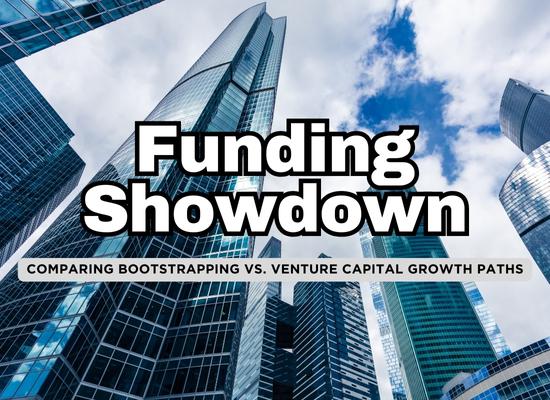When launching or scaling a business, choosing how to fund growth is a crucial decision. Bootstrapping—using personal savings or business revenue—offers independence, while venture capital (VC) provides access to significant funding for rapid expansion.
But which is the better route? Let’s dive into the pros and cons of each approach to help you weigh your options.
✅ Pro #1: Full Control Over Your Business
- Bootstrapping means you don’t answer to investors—you retain 100% control over decisions, company culture, and long-term strategy.
- Founders can prioritize sustainable growth rather than chasing aggressive revenue targets to satisfy investors.
- You decide when to scale, pivot, or reinvest profits without outside interference.
❌ Con #1: Slower Growth & Limited Resources
- Without external capital, growth is often slower and dependent on revenue or personal savings.
- Limited cash flow can restrict your ability to hire top talent, invest in marketing, or develop products as quickly as VC-backed competitors.
- Scaling too cautiously might allow competitors with more funding to dominate the market.
✅ Pro #2: All Profits Stay with You
- Since you own 100% of the company, all profits remain yours—there’s no need to share earnings with investors.
- No equity dilution means that if the business succeeds, you reap the full financial rewards.
- You can reinvest profits as you see fit, focusing on long-term value rather than short-term investor demands.
❌ Con #2: Personal Financial Risk
- Many bootstrapped founders use personal savings, home equity, or loans to fund their businesses, which can be financially risky.
- If the business fails, there’s no safety net—you absorb all the losses.
- Lack of external funding may mean missed opportunities for expansion or innovation.
✅ Pro #3: Freedom to Experiment & Pivot
- Since you’re not tied to investor expectations, you have complete flexibility to test different strategies, pivot business models, or take creative risks without external pressure.
- Many VC-backed startups face investor demands for quick returns, forcing them to scale prematurely or avoid innovative but uncertain ideas.
- Bootstrapped businesses can take a longer-term approach to refining their product and market fit.
❌ Con #3: Difficulty Competing Against VC-Backed Rivals
- In fast-moving industries, venture-backed companies can outspend bootstrapped startups on marketing, hiring, and technology.
- Without significant funding, it may be hard to compete in sectors where first-mover advantage is critical (e.g., tech, SaaS, and marketplaces).
- Customers may perceive well-funded competitors as more credible, making it harder to win contracts, partnerships, or media attention.
✅ Pro #4: No Pressure to Exit or Sell
- Bootstrapped founders aren’t forced to sell their company, go public, or seek rapid exits to satisfy investors.
- Many VC-funded businesses are pushed toward IPOs or acquisitions even when founders would prefer to keep the company private.
- You can focus on steady, long-term growth rather than worrying about when investors will demand their returns.
❌ Con #4: Harder to Attract Top Talent
- Without venture funding, offering competitive salaries and equity incentives to attract top-tier employees is more challenging.
- High-caliber candidates may prefer well-funded startups that can offer better pay, stock options, and perks.
- This can lead to a slower hiring process and longer timelines for building a high-performing team.
✅ Pro #5: Stronger Financial Discipline
- When every dollar comes from your own pocket, you’re naturally more careful with spending.
- Bootstrapped businesses often build leaner, more sustainable models with a focus on profitability from day one.
- This approach reduces wasteful spending, ensuring that every investment is strategic and necessary.
❌ Con #5: Limited Ability to Scale Quickly
- Without external capital, scaling can be slow and incremental, making it difficult to expand into new markets or ramp up production.
- Some industries (like tech and SaaS) require heavy upfront investment, making bootstrapping impractical for businesses that need a large user base to succeed.
- A lack of capital might mean missing out on time-sensitive opportunities that require a quick injection of funds.
✅ Pro #6: No Investor Expectations or Deadlines
- Bootstrapped businesses grow at their own pace without investor-imposed growth targets, revenue milestones, or strict timelines.
- This allows for organic decision-making, prioritizing product quality and customer satisfaction over hitting aggressive financial projections.
- Founders can avoid stress and burnout that often comes with VC-backed pressure to scale fast.
❌ Con #6: Limited Network & Industry Connections
- Many venture capital firms offer more than just money—they provide strategic guidance, introductions, and credibility.
- Bootstrapped founders miss out on mentorship from experienced investors, which can be invaluable for navigating industry challenges.
- Without a strong network, getting media coverage, forming partnerships, or securing high-profile clients can be tougher.
✅ Pro #7: Access to Large Amounts of Capital
- Unlike bootstrapping, venture capital provides substantial funding upfront, allowing startups to scale quickly.
- Businesses can afford to hire top talent, expand into new markets, and invest in R&D without waiting for revenue to catch up.
- Access to significant capital can help outpace competitors, especially in industries where speed to market is crucial.
❌ Con #7: Loss of Ownership & Control
- Taking VC funding means giving up equity, which dilutes the founder’s ownership.
- Investors typically demand a say in business decisions, sometimes pushing for strategies that prioritize fast growth over long-term sustainability.
- If multiple funding rounds occur, founders may end up owning only a small percentage of the company they built.
✅ Pro #8: Mentorship & Industry Connections
- Many VC firms offer more than just money—they provide strategic guidance, industry expertise, and access to powerful networks.
- Investors can introduce startups to potential customers, partners, and key hires, giving them a competitive edge.
- Having respected investors on board can boost credibility, making it easier to secure partnerships and media coverage.
❌ Con #8: High Expectations & Pressure to Scale
- VC-backed startups face intense pressure to grow quickly and generate massive returns.
- Investors expect rapid expansion, high revenue targets, and potential IPOs or acquisitions within a few years.
- This pressure can lead to burnout, rushed decision-making, and sacrificing long-term stability for short-term gains.
✅ Pro #9: Ability to Attract Top Talent
- With more funding, VC-backed companies can offer higher salaries, stock options, and competitive benefits to hire the best talent.
- Skilled employees are often drawn to well-funded startups that provide job security and career growth opportunities.
- Startups with funding can afford specialized roles, which helps in scaling operations faster.
❌ Con #9: Risk of Losing Your Vision
- Venture capitalists invest for returns, not necessarily for your original vision.
- If your startup isn’t hitting revenue targets, investors may push for pivots or even replace leadership.
- The pressure to scale fast can lead to short-term decision-making that may not align with your long-term mission.
✅ Pro #10: Competitive Advantage in the Market
- VC funding allows startups to scale aggressively, outspending competitors in marketing, product development, and expansion.
- Startups with strong financial backing often gain market dominance faster than bootstrapped businesses.
- Investors may also help startups secure strategic partnerships that give them an edge over competitors.
❌ Con #10: Potential for Future Funding Challenges
- Once a startup takes VC money, it often requires multiple rounds of funding to keep growing.
- If future rounds don’t materialize, businesses can run out of cash and struggle to survive.
- Some startups fail because they become dependent on external funding, rather than building a sustainable, profitable model.
Both bootstrapping and venture capital offer unique advantages and challenges, and the right choice depends on your business goals, risk tolerance, and long-term vision.
If you value control, financial independence, and sustainable growth, bootstrapping might be the better path—allowing you to grow at your own pace without external pressures. However, if rapid expansion, access to top talent, and industry connections are critical to your success, venture capital could provide the resources to scale quickly.
Ultimately, the best approach is the one that aligns with your business model and your personal vision as a founder. Some businesses thrive with slow, steady growth, while others need significant funding to compete in fast-moving industries. Whichever path you choose, the key is to stay strategic, adapt as needed, and build a company that aligns with your goals.



